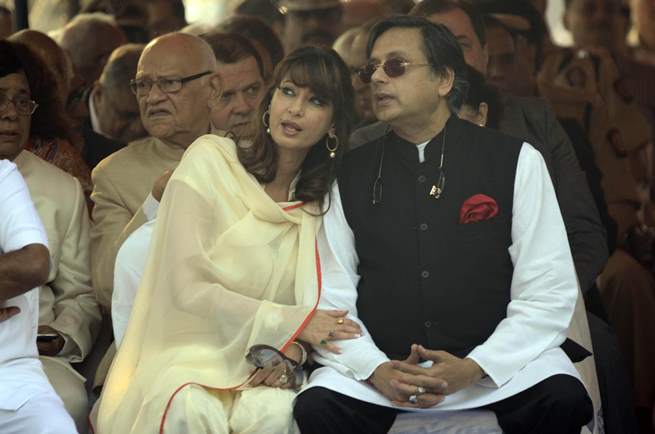Arts
Death By Twitter

Union Minister of State for Human Resource Development Shashi Tharoor with his wife Sunanda Pushkar in November 2013. She was discovered dead from a drug overdose in a New Delhi hotel less than two months later.
Social networking in these insatiable, exhibitionistic, let-it-all-hangout-times.
“This is murder by Twitter!” railed writer Suketu Mehta, following the mysterious death of Sunanda Pushkar, wife of minister of state for Human Resource Development, after a very public spat with him and a woman she accused of having an affair with her husband. The tweet set the ball rolling and tons of tweets flailed cyber space underscoring the rawness behind this loaded statement.
Journalist Malini Nair put it eloquently when she wrote that “Besides the deadly cocktail of depression, drugs, a strained marriage, questions have been raised about whether the vicious banter and collective howls of derision on social media over her very public spat and meltdown — again on social media — pushed her over the edge.”
The world today is both a hungry market place and jam-packed arena, waiting to consume any kind of excitement, from blood sport and emo-strips to gladiatorial battles and worse, deriving unimaginable vicarious pleasure of the perverse kind. Individuals too, desperate to embrace the world and detail every move and action to show one and all that they too are interesting people with interesting lives, forget to pay heed to danger signs and risk trouble. Forget to realize that the public and private lines of life are eroding. Forget that this seductive spectator sport involves vulnerable human souls too who suddenly, want to pull out, but can’t, having gone too far and forced to battle this rampaging Frankenstein with all that they have at their ill-equipped disposal.

Shashi Tharoor with his wife Sunanda pushkar in happier times.The writer Katherine Parker says: “I believe that its not just about not understanding the full implications of posting personal information, but also about being blind to the consequences: language we use and expressions we deploy. What most fail to understand too is that anything that’s written and published publicly is indelible, so one needs to be extra careful when we choose to share our most private moments and thoughts with others over this on-line medium.”
Nishant Shah, Director, Research Centre for Internet Society, Bangalore explains that in our desperation to be heard, something bizarre is happening, which is new and unprecedented. “The most personal and dark desires are played out as public spectacles and the results can be traumatic.”
Pushkar’s narrative, for example, exploded into tragedy within 48 hours. Shah suggests that it’s not that affairs and liaisons have not happened before, but they would pan out in private space, within friends and family, not amidst an entire constituency of lip-smacking voyeurs, deriving vicarious pleasures across the social media platform. Says Shah, “We live in a world of digital striptease and that ubiquitous and pervasive technologies that blitz us have forever blurred the lines between the real and virtual.”
It seems to be a case of too much too soon, so terrifyingly symptomatic of the impatient, novelty-seeking, frenzied times we live in. The huge high that informs quick connect with instant response is marked by a total lack of sensitivity and empathy. Says Shah: “We are so involved creating narratives of ourselves, instagramming every encounter which we experience that we seldom have enough time to stop, respond, think & reflect upon the human condition. We have become jaded to the various great moments in people’s timelines along with the pain that our insatiable involvement in the social network can bring to those who are the subject of our attention.”

You must be logged in to post a comment Login